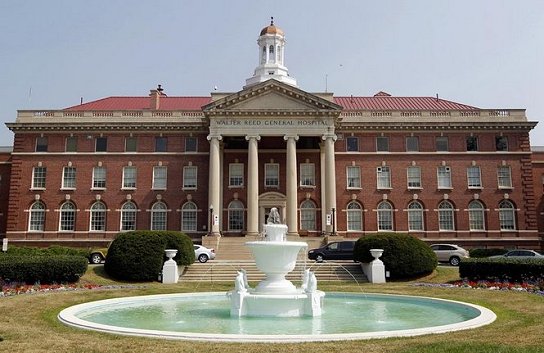
Walter Reed to close after more than a century
WASHINGTON (AP)
Walter Reed Army Medical Center, the Army’s flagship hospital where privates to presidents have gone for care, is closing its doors after more than a century.
Walter Reed Army Medical Center in Washington, D.C., many of them wounded warriors, make the five-mile move to the National Naval Medical Center.
The relocation will mark a historic moment in both iconic institutions’ histories and one of the final milestones before they officially merge to become the Walter Reed National Military Medical Center.
The new Walter Reed National Military Medical Center, which the staff here refers to simply as “Walter Reed Bethesda,” promises to take military medicine to a whole new level as it provides a central hub for specialized care, Bitonti said.
Hundreds of thousands of the nation’s war wounded from World War I to today have received treatment at Walter Reed, including 18,000 troops who served in Iraq and Afghanistan.
President Dwight Eisenhower died there. So did Gens. John J. Pershing and Douglas MacArthur.
It’s where countless celebrities, from Bob Hope to quarterback Tom Brady, have stopped to show their respect to the wounded. Through the use of medical diplomacy, the center also has tended to foreign leaders.
The storied hospital, which opened in 1909, was scarred by a 2007 scandal about substandard living conditions on its grounds for wounded troops in outpatient care and the red tape they faced. It led to improved care for the wounded, at Walter Reed and throughout the military. By then, however, plans were moving forward to close Walter Reed’s campus.
Two years earlier, a government commission, noting that Walter Reed was showing its age, voted to close the facility and consolidate its operations with the National Naval Medical Center in Bethesda, Md., and a hospital at Fort Belvoir, Va., to save money.
“For many of the staff members, even though they know that this is the future of the military health system, in a way, it’s still like losing your favorite uncle, and so there is a certain amount of mourning that is going on and it is an emotional time,” said Col. Norvell Coots, commander of the Walter Reed Health Care System.
The new facility will be called the Walter Reed National Military Medical Center. It will consolidate many of Walter Reed’s current offerings with the Navy hospital.
“Frankly, I will say it’s with a heavy heart that Walter Reed closes. I don’t know. I know that there was a process for that decision, but we’ve lost a great, important part of history,” said Susan Eisenhower, granddaughter of the former president.
She recalled bringing to the hospital a birthday cake she had baked for her grandfather, who spent the last several months before his death in 1969 in a special suite where politicians and foreign leaders visited him.
There are countless pieces of history throughout the campus.
At the rose garden, some nurses from the Vietnam War era were said to have married their patients. The memorial chapel is where President Harry S. Truman went for his first church service after taking office, following a visit with Pershing, who lived in a suite at Walter Reed for several years, said John Pierce, historian for the Walter Reed Society.
A marker identifies the spot on the hospital grounds where, long before the hospital was built, Confederate sharpshooters fired near President Abraham Lincoln, leading an officer to call Lincoln a “damned fool” and order him to the ground, according a brochure produced by Walter Reed about its history.
President Calvin Coolidge’s teenage son died in the hospital from an infected blister he received while playing tennis at the White House, Pierce said. A black and white photo from 1960 shows then-Sen. Lyndon Johnson, a vice presidential candidate at the time, visiting the bedside of Vice President Richard Nixon, who was being treated for a staph infection.
Presidents now are sent to Bethesda for treatment because it’s considered more secure, said Sanders Marble, senior historian with the Office of Medical History at Fort Sam Houston, Texas.
The hospital was named to honor Maj. Walter Reed, an Army physician who treated troops and American Indians on the frontier. Among his medical achievements was life-saving research that proved that yellow fever was spread by mosquito. He died in 1902 at age 51 of complications related to appendicitis with a friend and colleague, Lt. Col. William C. Borden, treating him.
“I’m sure (Borden) felt very guilty about that, and over the course of the next several years, he campaigned to get money for a new hospital and of course, wanted to name it for his good friend Walter Reed,” Pierce said.
The original redbrick hospital had about 80 beds, but inpatient capacity grew by the thousands during the wars of the last century. Today, it treats about 775,000 outpatients annually, and has an inpatient load of about 150. It wasn’t just service members and military retirees treated at the hospital over the decades, but their families, too. Countless babies were born at the hospital into the 1990s.
Rehabilitation for the wounded, including care for amputees, has been an important part of the mission since it opened. The wounded commonly spend a year or longer at the hospital now, although they are more quickly moved to outpatient care.
Photos from World War I show troops at Walter Reed learning skills such as typing and knitting. During World War II, brochures distributed to the war amputees featured pictures of amputees smoking and shaving. The message was, “Your life isn’t over, don’t get down,” Marble said.
“National Naval Medical Center will go into the history books, just like Walter Reed Army Medical Center will go into the history books as we come together to form Walter Reed Bethesda,” Bitonti said. “This will be two powerhouses coming together to form a new powerhouse that is quantifiably better than either of them separately.”
.

Wild Thing’s comment………
Sad news and Walter Reed has touched so many of our lives.
They will officially merge to become the Walter Reed National Military Medical Center.

I AM SO PROUD OF WALTER REED.THANK YOU,AND MY SON’S LIFE